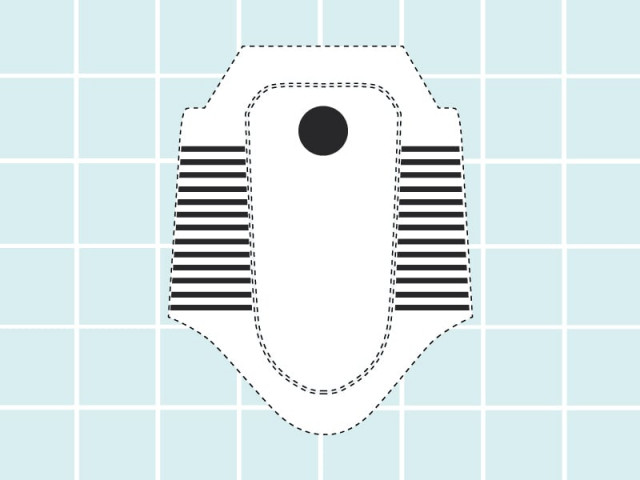World toilet day: Nowhere to go
The lack of public toilet facilities and ensuing sanitation problems plague urban centres as well.

While rural communities across the country continue to suffer, the lack of public toilet facilities and ensuing sanitation problems plague urban centres as well. DESIGN: KIRAN SHAHID
The light bulb flickered weakly at a public toilet in a local market. The toilet was cleaned that morning but the nauseating blend of chlorine bleach and clogged pipelines warned you that this toilet is unsafe to use.
In the capital, the condition of public toilet facilities remains bleak. “Most of the toilets don’t have water. No one files a complaint about their condition,” said Ali Mustafa, a tailor whose shop neighbours the toilet. “Drainage in Islamabad is an issue but I think the administration will wait for a disaster to happen before they really take some action.”
In a city where an estimated one million residents live, mushrooming new sectors are facilitating influx of population for which facilities available even now might not be sufficient. In this sprawling city, the total number of public toilets is 93. Of these, sanitary service for 61 is carried out through private contractors. Some 32 are being renovated and a proposal to construct 30 new restrooms is under consideration.

Speaking to The Express Tribune on condition of anonymity, a CDA official said that a complaint cell dealing with public toilets has been established in each sector. It works 24 hours a day. On an average, 80 complaints regarding drainage and sanitation are being addressed every day. But what remains a challenge for the Capital Administration is where to dump the waste.
What about the women?
When it comes to public restrooms, Lahore, the city with the history, does not cater too well to the bustling crowds. The most visited sites, including Lari Adda, Railway Station, Data Saaheb’s shrine, and the Walled City, direly lack toilet facilities.
Iftikhar Mubarik, a human rights activist working on issues of cleanliness, said these poor conditions must be urgently discussed from a gender perspective.
“You can observe men attending to calls of nature in public, but the women just can’t do that,” he pointed out. “Some contractors run private toilets, charging Rs10 to Rs20, but they are in bad condition. Most women don’t use them. The government must take action to address this.”
Data obtained by Central District Government Lahore (CDGL) revealed that there are less than 40 functional public toilets in a city that boasts a population of around 10 million.
According to Dr Mamoodul Hasan, a health consultant, the deleterious health effects should be underscored.
“If you pass by these busy spots, you are hit by foul smell,” he said. “The current condition is terrible, health-wise. Had the sanitation system been maintained properly, several stomach and skin diseases could have been prevented.”
Another CDGL official claimed that the Parks and Horticulture Authority (PHA) is responsible for providing public toilets but the facility remains undelivered. However, PHA spokesman Javaid Shaida refuted this, saying the authority maintains public toilets at its parks, but is not responsible for facilities in other parts of the city.
Fighting for a basic right
“Dirt on the floor, no water in the taps and non-functioning flushes make the few available public toilets a last option,” said Agha Syed Atta-u-Allah Shah, an activist from the NGO Raah-e-Raast.
Availability of toilets must be ensured at every public place as it is a biological need for all human beings and should be declared a ‘fundamental human right’, said Shah in his petition filed with the Sindh High Court. In his petition Shah has stated that due to unavailability of toilets in public places, people are forced to relieve themselves in isolated parks, footpaths and under the trees.
“We have pinpointed 2,200 places for the public toilets across the city of Karachi. Such places include 182 graveyards, 33 markets, 42 thoroughfares and 77 parks,” he added. “Karachi Metropolitan Corporation and Cantonment boards have public toilets at only 13 places; of these, only two – Karachi Zoo and Bin Qasim Park at Clifton – has toilets specifically for women.”
“I usually rush to nearby private properties to use the toilet. Sometimes I face sexual harassment when I need to use a public toilet” said a female activist.
Four months ago, the city administration had come up with the idea to establish 200 toilets at different locations. The idea has been shelved since then, officials said.
Commissioner of Karachi said that public toilets would be constructed soon. “We realise the need for public toilets in a city like Karachi. The project to establish public toilets would not be given up,” the commissioner promised on the World Toilet Day.
Students at a standstill
Toilets in government-run schools across Peshawar are in too bad a shape.
For instance, Government Higher Secondary School No 3 students complain that most of the restrooms are perpetually blocked. The few that work are in bad shape too. They also have to use the private facilities in Khyber Bazaar.
“Toilets in the schools are too few and very filthy,” said an eighth-grader. “The least our government could do is to provide sufficient funds to keep the existing ones usable.”
Residents in the city believe that toilet facilities maintained by private organisations, institutions and schools are far superior to the public ones. Most public toilets scattered in different parts of the provincial capital charge money for use. They are in comparatively good condition but only few can use them.
“Yes, we expect payment for using of toilets,” said the owner of a private toilet who charges Rs10 for a single use. “A small chunk of that is redirected to keep the toilet facilities clean.”
Published in The Express Tribune, November 19th, 2013.



















COMMENTS
Comments are moderated and generally will be posted if they are on-topic and not abusive.
For more information, please see our Comments FAQ